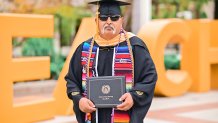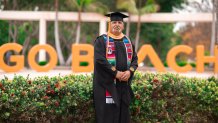Joseph Valadez was just 11 years old when he started getting arrested. He was 12 when he started doing drugs. And after spending over 30 years in and out of prison, he now has a master's degree in sociology from Cal State Long Beach.
Valadez recalls growing up in Orange County in the 1960s, in a marginalized community of Chicano veterans returning from World War II.
Growing up with five siblings, Valadez said he attended an all-white school where Chicano students made up about 1% of the student population.
“My first experience with discrimination was coming home and asking my mom what a wetback was. I was in kindergarten,” Valadez said.
Get top local stories in Southern California delivered to you every morning. >Sign up for NBC LA's News Headlines newsletter.
From kindergarten all the way through high school, he faced a lot more discrimination, leading to him getting into fights.
“There was a lot of pushback from the white community,” Valadez said. “‘Go back to Mexico, you beaner,’ all that.”
At that time, he was also watching his older friends, uncles and cousins drinking. At the age of 12, he was already drinking alcohol and smoking marijuana.
Local
Get Los Angeles's latest local news on crime, entertainment, weather, schools, COVID, cost of living and more. Here's your go-to source for today's LA news.
From ages 11 up until he was 18, Valadez was arrested several times for fighting, being under the influence of drugs and alcohol and breaking curfew.
“I started using when I was 12 years old, started drinking, smoking weed, and then I graduated to pills,” Valadez said. “By then I already had uncles and cousins, even homeboys from my neighborhood, they had already overdosed and died. There was no way, no how I was gonna stick a needle in my arm. But at 15, I started using heroin.”

Valadez had spent so much time in juvenile hall that he made up most of his high school credits and got his diploma from a continuation school in Garden Grove in 1976.
Shortly thereafter, he was arrested again and was presented with the option of going to prison for two years or doing four years of military service in order for the charge to be expunged from his record.
He chose the military and went to service from 1976 until 1980.
Valadez recalled that although he had experimented with heroin at the age of 15, he didn’t truly start using until he was in the service.
During his time in the Army, he was transferred to Germany, where he was using heroin and overdosed on a train in 1980. A friend saved his life and helped him come to.
“I had a little moment of clarity there,” Valadez said, thinking of the possibility that the Army could have sent a letter to his mother to inform her that her son had overdosed on a train.
Valadez said he got clean and was honorably discharged. But soon after, in 1980, he was back home.
As his family was celebrating his return, he went into his old room to find his brother and cousins using heroin, and he says he did some too.
Over the course of his life, in the 80s, 90s and 2000s, Valadez was arrested 40 different times. He had been arrested for stealing and selling and possessing drugs.
He spent over 30 years of his life going in and out of juvenile hall and prison.
In 2011, he found himself homeless living in his car in the driveway of a childhood friend’s home.
Some time later, that friend then gave Valdez methadone pills to help wean him off of the heroin and connected him to another friend to help him in his process of getting clean.
He spent time calling several rehab centers but was not able to find the help he needed.
He then came across the website for the Salvation Army of Anaheim, a faith-based rehabilitation center. On April 22, 2013, he showed up six days clean.
“Those were the longest six days of my life,” Valadez recalled. “They took me in when no one wanted me.”
There, he met his first sponsor, did a 12-step program and had a spiritual awakening.
Valadez left the Salvation Army a year later but returned every Wednesday to talk to others about how much the program helped him.
“I was so appreciative of that place,” Valadez said. “I owe those people my life.”
A counselor at the Salvation Army spoke to Valadez about the programs available to help veterans. That led to his journey back into school.
In June 2014, he began taking summer classes at Orange Coast College in Costa Mesa, where he double majored in sociology and American history.
A few years later, he transferred to CSULB to earn his bachelor's degree in sociology, where he got straight A's, made the president's honors list and dean’s list and finished with a 3.6 GPA.
While getting his bachelor's degree from CSU Long Beach, Valadez made long-lasting connections with some of his professors.
“The system tried to throw him away, but he’s still here persevering,” said Steven Osuna, an associate professor of sociology at CSULB. “He gives us an example of not giving up on people.”
Osuna recalls meeting Valadez in the hall while he was earning his bachelor's degree. Osuna told him about a class he was teaching, and Valadez enrolled.
“Joseph was deeply invested as a student, not just intellectually but emotionally as well,” said Esa Syeed, an associate professor of sociology at CSULB.
Syeed and Valadez met after he took a couple of Syeed’s classes, and have continued to stay in touch over the years.
“I hope his story not only inspires other students, but also inspires change in our institutions. So much change is needed across systems of policing, incarceration, and education,” Syeed said.
Despite everything, Valadez said he has no animosity, no grudges and no hatred in his heart.
This past April, he celebrated being 10 years clean.
"In my case, I'm blaming the system," Valadez said. "The system never asked me if I had a drug problem. The system never asked me did I want some help. Nobody asked me."

Valadez spent a lot of time with his professors during their office hours, talking with them about his life experiences. He said his professors were influential in showing him that he could make a difference in the world.
After speaking with a mentor, Valadez decided to apply to the master’s program at CSU Long Beach.
“For the first time in my life, I was gonna do everything the right way. No matter what trials and tribulations that would come in front of me, I was gonna overcome them, and I was gonna do it the right way," Valadez said. "I'm big on integrity."
Now, Valadez has a master's degree from CSULB and looks forward to going into a career in social work.
“I hope I can continue to be a beacon of hope for somebody. If my story inspires, if my story motivates, and above everything else if my story gives somebody hope, so be it,” Valadez said.



